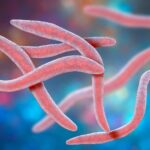[toc]
What is already known on this topic
Studies have suggested that the make-up of the gut microbiota is linked to overall lifespan of the host, with specific compositions appearing to be predictive of host’s age and mortality. However, the link between gut microbes and host lifespan has largely been studied in invertebrates and mice with shortened lifespan, and there has been a paucity of data on whether early-life antibiotics could affect the lifespan of healthy mice.
What this research adds
Researchers assessed the effect of early-life antibiotics by exposing healthy newborn mice to antimicrobial drugs and then tracking the animals until old age. As expected, antibiotics depleted the mice’s gut microbiota. After this depletion, the animals’ intestines were recolonized with either one of two different dominant types of microbiota, which the researchers dubbed ‘PAM I’ and ‘PAM II.’ Mice with PAM II microbiota had increased insulin resistance and high levels of inflammation later in life. These mice also died at about double the rate of animals with PAM I microbiota, despite both groups being exposed to the same antibiotics. The researchers observed similar effects when recolonizing germ-free mice with either PAM I or PAM II microbiota.
Conclusions
The findings suggest that differences in the microbiota following antibiotics exposure in early life can reprogram the immune system, leading to consequences on immunity, metabolism and lifespan later in life.
Gut microbes appear to regulate many biological processes, including host lifespan. Now, researchers have found that the type of microbiota that recolonizes the gut after exposure to antibiotics in early life can lead to a shortened lifespan — at least in mice.
The findings, published in Cell Reports, suggest that differences in the microbiota following early exposure to antibiotics can reprogram the immune system, leading to consequences on immunity, metabolism and lifespan later in life.
Studies have suggested that the make-up of the gut microbiota is linked to overall lifespan of the host, with specific compositions appearing to be predictive of host’s age and mortality. However, the link between gut microbes and host lifespan has largely been studied in invertebrates and mice with shortened lifespan, and there has been a paucity of data on whether early-life antibiotics could affect the lifespan of healthy mice.
“This is the first time we’ve been able to monitor the impact that changes in gut microbiome due to antibiotics in early life can have on mice throughout their normal lifespan,” says study senior author David Lynn.
To assess the effect of early-life antibiotics on lifespan, Lynn and his colleagues exposed healthy newborn mice to antimicrobial drugs and then tracked them animals until old age.
Reduced lifespan
As expected, antibiotics depleted the mice’s gut microbiota. After this depletion, the animals’ intestines were recolonized with either one of two different dominant types of microbiota, which the researchers dubbed ‘PAM I’ and ‘PAM II.’
Adult mice with PAM II microbiota had increased insulin resistance, which indicated metabolic dysfunction. The rodents also had high levels of inflammation in several tissues such as the blood, liver and brain. These mice died at about double the rate of animals with PAM I microbiota, despite both groups being exposed to the same antibiotics.
“Our data suggests that the type of microbiome that repopulates the gut after antibiotics has the potential to reprogram the mammalian immune system with long-lasting effects including on longevity,” Lynn says.
Microbiota effect
To confirm that the results were due to differences in the type of microbiota that recolonized the mice’s gut and not to antibiotics exposure, the researchers colonized rodents grown in the absence of microbes with the PAM I and PAM II microbiota.
Also in this case, the team observed changes in the immune system of the germ-free mice colonized with the PAM I microbiota compared to those colonized with the PAM II microbiota. Mice with PAM II microbiota also had altered immune responses, with increased levels of inflammatory molecules.
The results could help to explain why previous studies in humans have produced conflicting results on the long-term health effects of antibiotics. This variability may be due to the type of microbiota that recolonizes the gut after exposure to antibiotics, the researchers say.











